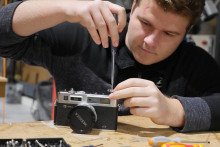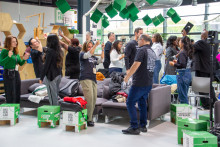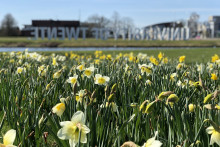The event is organized by DreamTeam, a multidisciplinary team that runs the DesignLab. Tim de Ruiter (MSc Industrial Design Engineering), the main organizer, explains the reasoning behind the Fix-It Sessions: ‘Per Lansink’s Ladder, recycling is only the third most effective method to reduce waste. Reducing and reusing are far more effective. This is what we want to promote with this event. We wanted to make the DesignLab more sustainable.’
‘People throw away a broken product, even if it can still be fixed,’ continues De Ruiter. ‘Quite often it is easier than you think to just repair it. You don’t even need to have great technical skills, it can be straightforward. For example, this Senseo machine wasn’t working. All we had to do was unclog the overpressure relief [air vent].’
Fixing an old rangefinder
De Ruiter himself brought an old rangefinder to the event. It’s a Yashica Electro 35GS, a Japanese camera from 1970. Two parts need to be fixed: the glass that you look through and the battery. ‘The glass is simple,’ Tim says. ‘We just need to open it and clean the interior. The battery will be more challenging, since these are no longer being sold. We need to 3D-print a custom case for a new battery and hope that we can make it work.’ At the time of writing, this was still an ongoing project.
Also present at the event and actively helping with repairs, is Adorian Krivosik (BSc Technical Computer Science). ‘I did not bring anything this time,’ he says. ‘But I will definitely come to the next session and maybe bring something with me. Together with some friends I already fixed our washing machine last week which was quite challenging, so I understand the importance of fixing and reusing a product rather than throwing it away.’
The next Fix-It sessions will be held on the 9th and 23rd of January 2018. Both take place from 7-9.30pm in the DesignLab. Joining is free and it is not necessary to sign up.








